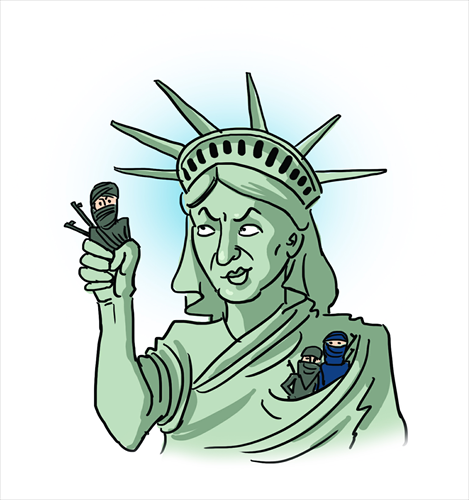US should back China’s anti-terror efforts

Illustration: Liu Rui/GT
The US government and media have outraged the Chinese people with their indifferent attitude toward the inhumane Kunming terrorist attack on the evening of March 1. Some 29 innocent civilians were slashed to death and over 140 injured, with the senior, women and children included.
The mob came from Xinjiang Uyghur Autonomous Region, and a black, hand-painted flag of the East Turkestan Islamic Movement was found at the scene.
However, quite a few Americans view this attack as a legitimate action by a Chinese ethnic group striving to justify their rights and these extreme Islamic "jihadists" as human rights defenders.
From the 9/11 attacks in 2001 to the Boston Marathon bombings in 2013 in the US, the Chinese government and people always expressed sympathy and support in an explicit way for the US when it was plunged into calamity. But Washington adopts a double standard in tackling terrorism, not only sabotaging the positive development of Sino-US relations in the long term, but also risking blowback.
As a policy term, blowback means that political organizations endorsed by US government agencies like the CIA finally target the US.
For instance, some attribute the rise of militant Islamic groups in Afghanistan to support provided to anti-Soviet forces by the US in the 1980s.
The US has fallen victim to its own geopolitical game in which it took advantage of extremists.
Then came the explosions during the Boston Marathon in April 2013. Russian intelligence agencies had informed Washington of the attack plan of some Chechen extremists in as early as November 2011, but the latter paid little heed to such information due to its dubious affiliation with Chechen separatists.
US Senator Rand Paul questioned why culprits from Chechnya, a hotbed for Islamic extremists, would be protected by the US. In actuality, Ilyas Khamzatovich Akhmadov, exiled foreign minister in Chechnya's separatist government, has not only been to the world's greatest power to launch political lobbying but also obtained political asylum. Most ironically, it was a Boston judge who approved Akhmadov's application for asylum.
Principal members of the American Committee for Peace in Chechnya, the separatist forces' lobby in the US, consist of former national security advisor Zbigniew Brzezinski and James Woolsey, former director of the CIA.
Furthermore, Washington has committed other severe errors in its anti-terror endeavor. In 2003 when the flames of the war in Afghanistan were still blazing and Al Qaeda was still plaguing the whole world, the US waged the war in Iraq under false pretences, offering a chance for terrorist forces. It was proved, however, the Saddam Hussein administration neither had connections with Al Qaeda nor weapons of mass destruction.
The Obama administration prefers drones to ground forces in fighting terrorists, but the prohibitive manslaughter rate by drones has caused hatred among local residents, making it easy for terrorist forces to recruit members.
According to Thomas Hegghammer, a Norwegian scholar who specializes in violent Islamism, the two wars have bred some 10,000 to 30,000 Muslim jihadists.
Now the US government will withdraw its troops from Afghanistan by the end of 2014. Washington attempts to hand over the burden to the weak Afghan government to fight against terrorism. The whole Central Asian region including Afghanistan will likely become a safe haven for Al Qaeda and other terrorist forces.
The terrorist forces in Central Asia constitute a headache for Russia and China, but will the US be free from their attacks?
Washington adopts a double standard in this connection and rejects committed cooperation with Beijing and Moscow, triggering discontent even in New Delhi.
Safeguarding the stability in Afghanistan and improving anti-terrorism capacity could have become an important area of Sino-US cooperation. Plus, the US could have worked with China, Russia and India to forge a coalition against Islamic extremism. But it is perhaps losing these opportunities.
The Kunming attack has touched the nerves of not only China but also the US that should remain alert to the relevant warning signs. Supporting China in the anti-terror war is in the long-term interest of the US.
The author is a research fellow with the Charhar Institute and an adjunct fellow with the Center for International and Strategic Studies, Peking University. opinion@globaltimes.com.cn